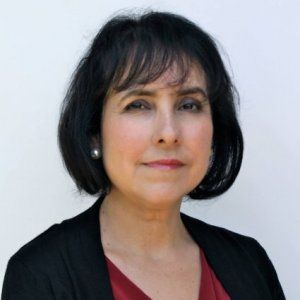Please read Cecilia González-Andrieu's biography from the Loyola Marymount University website....
The 6 Things Vulnerable Immigrants Need You to Hear
It’s an afternoon last week and we’re talking through video cameras, or it’s an afternoon the semester before and a student is sitting in my office, tearfully releasing years of pent-up emotion, or it’s an afternoon in the last decade and we’re walking together, trying to fit this conversation between classes. Each of these experiences is a privileged moment that happens only as we build trust. In each instance I can truthfully say “I remember…, I know…, I felt.” These are important words of companionship and purposeful vulnerability, and they make evident how vital it is for students of color to know faculty who not only look like them, but more significantly have encountered the world in a way that shares and values their own experiences.
In these last three years, these conversations about the wounds that vulnerable immigrants and their children carry have become more painfully urgent. I have been called to heartbreaking prayer groups with custodians, to many hours spent making sense of bureaucratic messes, to the homes of the sick, to tearful funerals, to raising money for the furloughed and unemployed, to reading legal briefs, to countless demonstrations and to simply embracing a fellow human trying to survive. Trumpism has been particularly hard on immigrant families and people of color, and its rise requires us to begin pealing back some of the taboo subjects we didn’t acknowledge or discuss even among ourselves.
As a public theologian-teacher-activist, I want to give you a glimpse into these conversations because they reveal some of the burdens we need everyone’s help to carry.
1. We are defined by others.
As a child, I remember the taunts. I was an “alien,” an outsider. I was named by others, not for the dynamic and fragile self I was growing into but through hurtful labels that made it easy for me to be dismissed. Today, some of my students are called “illegals,” elders recall being called “spics’ and “beaners” and Latinx people, lumped together under loathsome xenophobic labels, have been made into the fuel for Trumpism’s fire: not fellow humans, not neighbors, not made in the image of God.
2. We carry internalized racism.
Without sympathetic mirrors in which to see ourselves, we believe these denigrating labels and sink into our own perceived unworthiness. We even classify ourselves by levels of whiteness, knowing that those of us who can pass as white will have a much easier time than those of us who can’t. Some of us align ourselves with the powerful hoping for acceptance. We live between the exhaustion of marginality or the self-hatred of complicity, and we often see no way out.
3. We feel like impostors.
When we are accepted into a university, a graduate program, or coveted job, we often feel that “it’s just too good to be true.” My students, whose parents are farm or factory workers, tell me about the phone call from our university announcing their awarding of the coveted Social Justice Scholarship. The memories are of tears and then cautious stoic disbelief— always afraid someone has made a mistake. Sometimes it takes these young people years to believe that we belong to each other and that their flourishing is truly our most central concern.
4. We battle survivor syndrome.
As the first in my family to go to college, I cried my first few nights in my new university dorm room, asking myself “why am I here?” I had shared a room with my Abuela my whole life. I was accustomed to trying to figure out how to pay rent, or talk to the landlord about our substandard living conditions. Now here I was in a beautiful room, outside my window were fragrant trees and an ocean breeze. My heart ached and I reproached myself for this privilege, knowing that outside my Abuela’s window was a car body shop full of noise and toxicity. How could I spend my time with books and college life, while my family was home struggling to survive? So many of my students live in this constant paradox and it becomes paralyzing, keeping us from joy and from claiming our rightful place.
5. We face a relentless but also revelatory “cotidiano.”
The vulnerable cannot choose their daily experiences: lo cotidiano. Situations come at us and must be faced. I listen to my friend who works at a food packing plant and spends a month gravely ill with coronavirus. He is now waiting for a clean bill of health to return to that same plant so he can feed his family. He has no other choice and his voice reveals a wounded grace. He cries as he talks about his faith and reaching out for God’s embrace. His suffering, echoing the wisdom of many religious traditions, continually reveals to him his need of God. His religious beliefs mature, not built on abstract propositions but on the real, abiding presence of God in the midst of every day.
6. We need to take care of ourselves before we can take care of others.
Those conversations in my office, in the quad or on a call, almost invariably end here: “How are you taking care of yourself?” I ask. Everything about the life of my “undocu” student or my friend on the custodial staff has always centered on taking care of others. For them, our Ignatian motto of “being women and men for others,” forms the core of their identity, not as a nice slogan but as an exhausting reality. Part of my work is to help us see that we carry deep within us as a script, which tells us we have no worth, but that perhaps by helping others we can at least be useful, útiles.
We talk about small children, the elderly, the sick, “aren’t they God’s beloved?”
A light appears in their eyes, “yes, they are!” I press on, “are they being useful to anyone?” the light burns brighter, “no.” We talk, about how each person that calls us to a deeper love brings us to a truer sense of ourselves, how my Abuela, even when she was elderly and blind, filled my life with joy, I so loved who she was, and this sense of her inherent worth made my heart grow! “But she needed me to care of myself,” I tell my students, “so I could finish school, so I could do what she worked for and dreamed for me.”
“We need to make sure we have our oxygen mask on,” I tell them recalling airplane safety videos, “so we can then help others.” We look into each other’s eyes. “Yes, we need our oxygen.” Someone has understood our weariness and honored it.
Communities of color need those who would be our allies to know how these often-unnamed realities weigh on us. We need accompaniment, space, and encouragement. We need to be made present, to be seen, and to be heard. And if we look tired, it’s because we are. We need a breather, the fresh oxygen of accompaniment and then to have a mirror held up to us that says “you are unconditionally loved.” That’s the God I believe in, the One who is madly in love with us, not in spite of but because of our beautiful fragility.
Special thanks to my graduate students Manuel Valencia, Hilda Tapia and Leonardo Mendoza, who shared their experiences with me and read a first draft of this essay. We do this work together, en conjunto.


